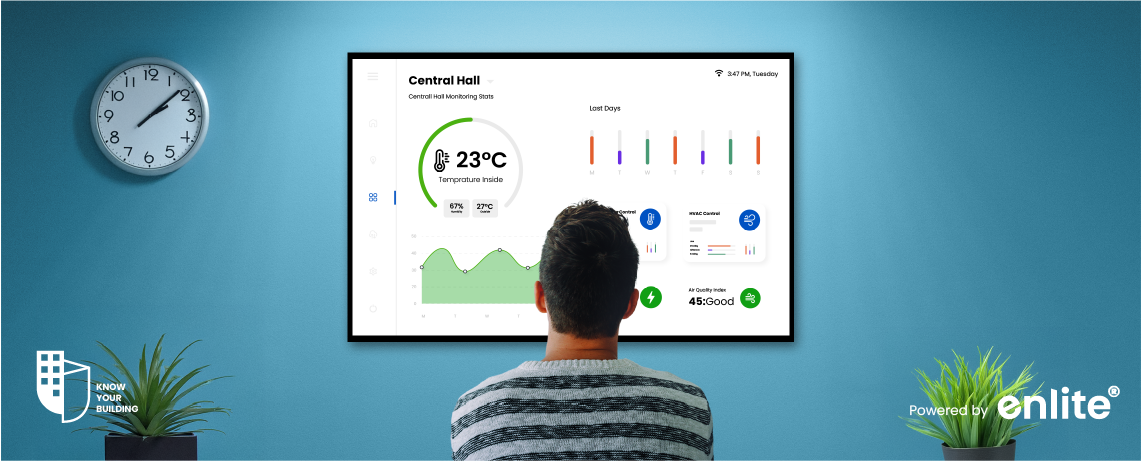The built environment plays a crucial role in shaping the modern world, from towering skyscrapers to sprawling commercial complexes. With increasing urbanization and the growing emphasis on sustainability, the need for smarter, more efficient building operations has never been more pressing. This is where Building Control Systems (BCS) step in, revolutionizing the way we manage and operate our structures. In this blog, we will explore how leveraging Building Control Systems can enable smarter operations and help organizations meet their sustainability goals.
What Are Building Control Systems?
Building Control Systems are integrated solutions designed to monitor, manage, and automate various aspects of building operations. These systems encompass Heating, Ventilation, and Air Conditioning (HVAC), lighting, water management, access control, and energy consumption. By leveraging advanced technologies like IoT, cloud computing, and artificial intelligence, BCS transform buildings into smart, responsive ecosystems.
Our cloud-native wireless Building Management System (BMS) is a prime example of such a solution, seamlessly integrating with access control systems to provide real-time insights and optimization capabilities. This enables facility managers to make informed decisions, enhance occupant comfort, and reduce operational costs.
The Benefits of Building Control Systems
1. Energy Efficiency
Energy efficiency is a cornerstone of smart building operations. With Building Control Systems, facility managers can monitor energy consumption in real time, identify inefficiencies, and implement corrective measures. Features like automated lighting control, temperature regulation, and predictive maintenance significantly reduce energy wastage.
2. Enhanced Occupant Comfort
A smart building prioritizes the well-being of its occupants. Building Control Systems allow precise control over indoor environments, ensuring optimal temperature, air quality, and lighting conditions. This not only boosts productivity but also enhances the overall experience for employees, tenants, and visitors.
3. Cost Optimization
Operational efficiency directly translates to cost savings. By automating routine tasks and optimizing resource allocation, Building Control Systems minimize unnecessary expenditures. Predictive maintenance further reduces downtime and repair costs by addressing issues before they escalate.
4. Data-Driven Insights
Data is the backbone of smart operations. Building Control Systems collect and analyze data from various sensors and devices, providing actionable insights. These insights enable facility managers to identify trends, predict future needs, and make strategic decisions to improve building performance.
5. Sustainability and Compliance
As climate change continues to dominate global discussions, sustainability is no longer optional. Building Control Systems support green initiatives by reducing carbon footprints, optimizing resource usage, and ensuring compliance with environmental regulations. Our solutions, for instance, align with global sustainability goals by promoting energy conservation and reducing emissions.
Cloud-Native Wireless BMS: The Future of Building Management
Traditional building management systems often rely on complex wiring and siloed operations, which can be expensive to install and challenging to maintain. Cloud-native wireless BMS represents a significant leap forward, offering unparalleled flexibility, scalability, and cost-effectiveness.
Key Features of Our Cloud-Native Wireless BMS
- Wireless Connectivity: Eliminates the need for extensive wiring, reducing installation costs and time.
- Real-Time Monitoring: Provides instant access to building performance data, enabling proactive management.
- Remote Accessibility: Allows facility managers to monitor and control building operations from anywhere, ensuring business continuity.
- Scalability: Easily adapts to growing operational needs, making it suitable for buildings of all sizes.
- Integration with Access Control: Enhances security and operational efficiency by unifying building management and access systems.
How Access Control Enhances Smarter Operations
Access control is a critical component of any Building Control System, ensuring security while optimizing operations. By integrating access control with our cloud-native wireless BMS, businesses can:
- Improve Security: Monitor and restrict access to sensitive areas in real time.
- Enhance Operational Efficiency: Automate workflows based on access patterns, such as adjusting lighting and HVAC settings when occupants enter or exit a room.
- Streamline Compliance: Maintain detailed access logs to meet regulatory requirements.
Real-World Applications
1. Commercial Real Estate
Building Control Systems are invaluable in commercial real estate, where tenant satisfaction and operational efficiency are top priorities. For instance, our wireless BMS enables property managers to provide a seamless, comfortable experience for tenants while minimizing operational costs.
2. Hospitality Sector
Hotels and resorts can significantly benefit from automated systems that ensure optimal guest experiences. Smart lighting, climate control, and access management create an environment of luxury and convenience.
3. Healthcare Facilities
In hospitals and clinics, maintaining precise control over indoor conditions is critical. Our solutions ensure compliance with health and safety standards while optimizing energy use.
4. Manufacturing Units
Efficient resource management is key in manufacturing. Building Control Systems help monitor energy-intensive equipment, streamline workflows, and reduce downtime.
The Path to Smarter, Sustainable Buildings
As a climate tech company, our mission is to decarbonize the built environment through innovative solutions like cloud-native wireless BMS and integrated access control. These technologies empower organizations to transition toward smarter, more sustainable operations.
Investing in Building Control Systems is not just about reducing costs; it’s about creating buildings that are resilient, adaptable, and environmentally responsible. By leveraging these systems, businesses can unlock new levels of efficiency and contribute to a greener future.














